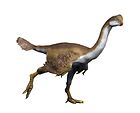Hollanda luceria
| Hollanda luceria Temporal range: Late Cretaceous,
| |
|---|---|

| |
| Reconstruction of Hollanda luceria. | |
| Scientific classification | |
| Kingdom: | Animalia |
| Phylum: | Chordata |
| Clade: | Dinosauria |
| Clade: | Saurischia |
| Clade: | Theropoda |
| Clade: | Avialae |
| Clade: | Ornithothoraces |
| Clade: | Euornithes |
| Genus: | †Hollanda Bell et al., 2010 |
| Species: | †H. luceria
|
| Binomial name | |
| †Hollanda luceria Bell et al., 2010
| |
Hollanda is a genus of small ground birds known from fossils found in the Barun Goyot Formation of Mongolia. Found at , it dates from the late Cretaceous period (Campanian stage), about 75 million years ago. Known only from partial hind limbs, Hollanda has long legs with an unusual configuration of the toes. These indicate that it was a fast-running ground bird, possibly similar to the modern Roadrunner.[1] Its relationships are uncertain. Some studies have found that it was an relatively advanced bird, a member of the Ornithurae, related to birds like Ichthyornis. Other studies have recovered it as a member of the primitive family Songlingornithidae.[2] A more expansive study found it as an enantiornithean.[3]
References[]
- ^ Bell, A.K., Chiappe, L.M., Erickson, G.M., Suzuki, S., Watabe, M., Barsbold, R. and Tsogtbaatar, K. (2010). "Description and ecologic analysis of Hollanda luceria, a Late Cretaceous bird from the Gobi Desert (Mongolia)." Cretaceous Research, 31(1): 16-26. doi:10.1016/j.cretres.2009.09.001
- ^ O’Connor, J. K.; Zhang, Y.; Chiappe, L. M.; Meng, Q.; Quanguo, L.; Di, L. (2013). "A new enantiornithine from the Yixian Formation with the first recognized avian enamel specialization". Journal of Vertebrate Paleontology. 33: 1–12. doi:10.1080/02724634.2012.719176.
- ^ Hartman, Scott; Mortimer, Mickey; Wahl, William R.; Lomax, Dean R.; Lippincott, Jessica; Lovelace, David M. (2019). "A new paravian dinosaur from the Late Jurassic of North America supports a late acquisition of avian flight". PeerJ. 7: e7247. doi:10.7717/peerj.7247. ISSN 2167-8359. PMC 6626525. PMID 31333906.
Categories:
- Late Cretaceous birds of Asia
- Fossil taxa described in 2010
- Prehistoric avialans















